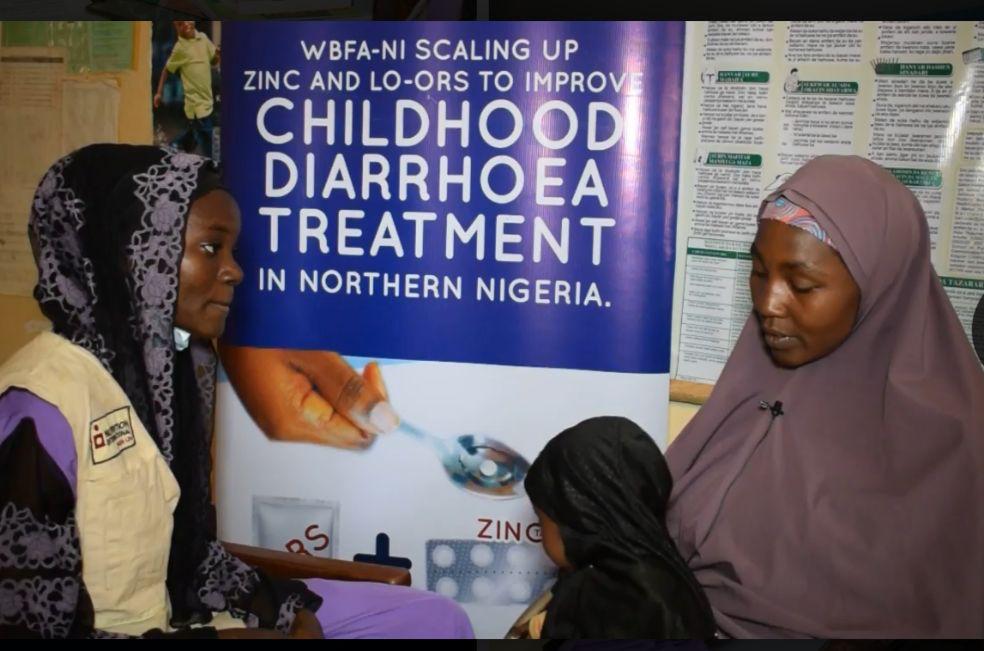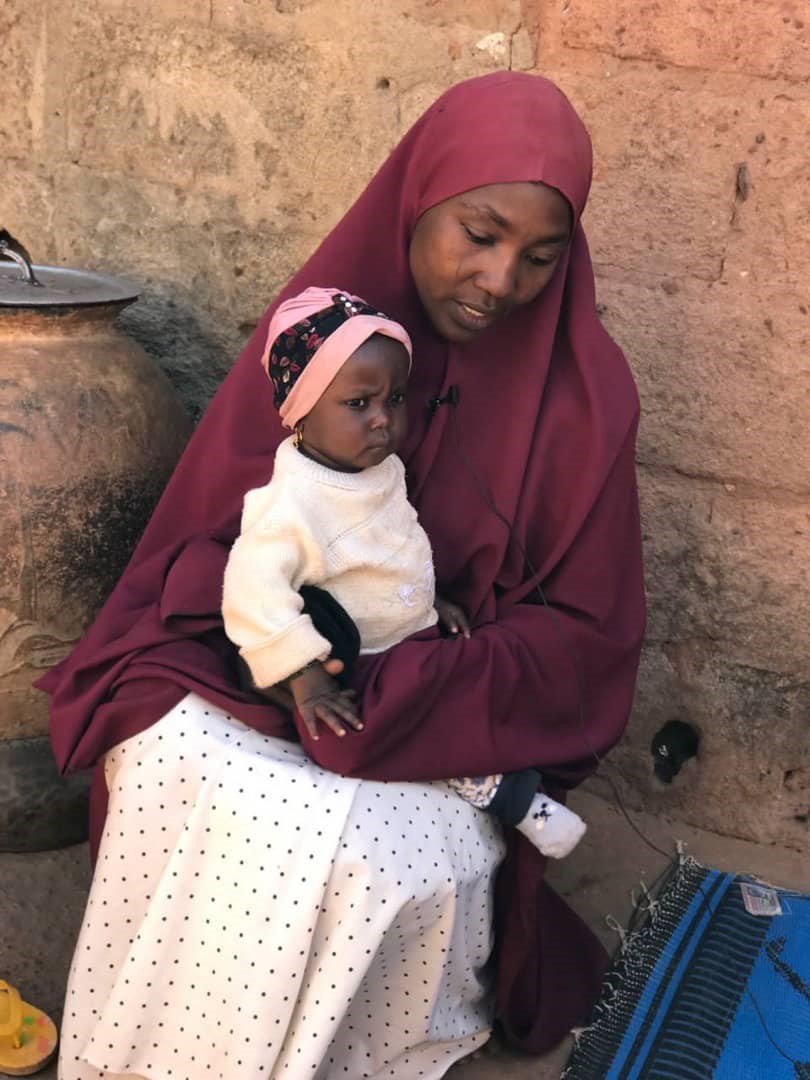Field Stories
Ten must see global nutrition stories from 2023
December 18, 2023
Helping kids be kids: reducing child mortality caused by diarrhoea in Nigeria
The Zinc Alliance for Child Health helps improve diarrhoea management in children under five in Northwest Nigeria. For fifteen-month-old Hussaina, it’s made a life-altering difference.
Posted on July 26, 2022
Thirty-four-year-old Malama Nafisa Almustapha thought her daughter would die before daybreak. Hussaina, her fifteen-month-old, was on her fifth day of aggressive diarrhoea episodes. She was very weak and had lost her appetite. Nafisa was already aware of two other children in her community of Gagi in Sokoto, Nigeria, who had died after having severe diarrhoea.
Earlier in the week, Nafisa had decided not to seek treatment at her community health centre because she thought there was no way to afford the cost of medicine and seeing the doctor. Instead, she gave her daughter an herbal remedy. The situation worsened. She subsequently sought out an unlicensed drug seller in the community and was given an antibiotic, but it did not resolve or reduce the severity of the episodes.
“I asked people around to begin digging her burial ground,” Nafisa says.
According to the World Health Organization, Nigeria tops the list for the highest number of deaths for children under five in the world. In 2019, eighteen per cent of those deaths were attributed to diarrhoea – the highest percentage of any country.
In 2021, the Zinc Alliance for Child Health (ZACH) supported the Government of Nigeria to implement a program to provide a zinc and low-osmolarity oral rehydration salt (LO-ORS) combination treatment to improve diarrhoea outcomes in northern Nigeria. The alliance is a partnership between the Government of Canada, Teck Resources Limited and Nutrition International.

The program provides technical assistance, financial assistance and educational interventions for diarrhoea management for children under five. It’s divided into two parts. The first is centred around health system strengthening, which includes procuring zinc and LO-ORS, a co-pack of ingredients known for being an effective, low-cost treatment to help reduce the duration and severity of diarrhoea episodes and help children recover faster from them.
The second component uses behaviour communication interventions to promote education and awareness about diarrhoea management for both health workers and parents. This includes providing educational materials to support interpersonal communication between health workers and caregivers; leveraging social media, producing radio jingles and short TV dramas, and utilizing mobile phone applications to reach spouses and partners of primary caregivers; and running guided discussions to promote community engagement about diarrhoea management and practicing family hygiene.
After five days of persistent stooling, loss of appetite and weight loss – and out of options – Nafisa rushed her child to the emergency unit of the health centre. On arrival, Hussaina was found to be severely dehydrated, evidenced by loss of consciousness, sunken eyes, a weak pulse, dry and wrinkled skin, and rapid breathing. The staff on duty determined she was in hypovolemic shock.
“The program is very important to prevent and reduce under-five mortality and morbidity rates resulting from acute watery diarrhoea and to improve health outcomes in children experiencing diarrhoea episodes.
— Lanre Daodu, Senior Program Officer for Child Health and Nutrition in Nigeria, Nutrition International
Trained on how to manage severe diarrhoea through ZACH, the health personal admitted Hussaina and closely monitored her over the next 24 hours. After her fluids were replenished her vital signs improved. Once responsive, she started to drink water on her own. Nafisa was shown how to administer the treatment of zinc and LO-ORS to her daughter after the first dose was given in her presence.
“When we rushed her to the health centre in the morning, the health worker attended to us timely, took care of her without charging us, all the services rendered were free of charge, and she recuperated,” Nafisa shares.
Once Hussaina was clinically stable and ready for discharge, midwives trained by the program spoke with both parents about what happened. They learned about likely culprits of the diarrhoea (in their case, unclean feeding bottles that attracted flies), the importance of promptly seeking healthcare at the health facility if it happens again, and how to mitigate that possibility by taking care of their personal and environmental hygiene and sanitation with an emphasis on handwashing.
In addition, the family was counselled on food diversification and fortification by using locally sourced foods and discouraged from using self-medication and traditional remedies for any childhood illnesses.
Hussaina was assigned one health worker and one community volunteer to receive weekly follow-ups at home. On the first visit, Nafisa confirmed Hussaina’s diarrhoea stopped 48-hours after using the zinc and LO-ORS treatment. Seeing first-hand the sanitation practices at home, the team was able to specifically show how to maintain personal and household hygiene within the family, addressing water storage, cleaning practices, and waste disposal. On a second follow-up visit, the team observed significant improvement in family hygiene.
Members of the program team also visited the unlicensed drug seller who provided Nafisa with the antibiotic that didn’t help. Known as a “drug hawker,” these are individuals who sell drugs with no regulation or oversight. Nigeria’s National Agency for Food and Drug Administration and Control (NAFDAC) has condemned the practice because of the potentially fatal results.
After receiving training, the unlicensed drug seller became one of the project’s community volunteers – spreading the knowledge and awareness needed so cases don’t become as dire as Hussaina’s.
The person admitted to using a drug called Flagyl to treat diarrhoea disease and that she didn’t know about zinc and LO-ORS as effective treatment. The team educated her on treating diarrhoea disease in children with zinc and LO-ORS and advised her to refer all children with diarrhoea cases to the health centre. After receiving training, the unlicensed drug seller became one of the project’s community volunteers – spreading the knowledge and awareness needed so cases don’t become as dire as Hussaina’s.
“The program is very important to prevent and reduce under-five mortality and morbidity rates resulting from acute watery diarrhoea and to improve health outcomes in children experiencing diarrhoea episodes,” says Lanre Daodu, Nutrition International’s Senior Program Officer for Child Health and Nutrition in Nigeria.

Daodu highlights the compounding factors that cause diarrhoea to lead to death, if left unchecked. “The dangers are that the child will become undernourished due to an inadequate diet and repeated episodes of diarrhoea or will succumb to the dehydration caused by an acute episode of diarrhoea. Unfortunately, these processes are interrelated; undernutrition increases the child’s susceptibility to infection so that the child experiences more frequent and severe episodes of diarrhoea, and in turn, the diarrhoea episodes accelerate the development of undernutrition.”
This is why a holistic approach, of both treatment and prevention, is so important.
“I promise to follow all the advice given to my family by the health workers,” Nafisa shares when reflecting on her experience. “Finally, I am grateful to God, the health workers at the health centre, and the organization that provided the government with the medicine needed to treat diarrhoea.”
Formed in 2011, the Zinc Alliance for Child Health is a global partnership between Nutrition International, the Government of Canada, and Teck Resources Limited to reach millions of children with zinc and LO-ORS treatment. Over the past ten years, it has supported projects in Bangladesh, Burkina Faso, Ethiopia, India, Kenya, Nigeria, Pakistan and Senegal.